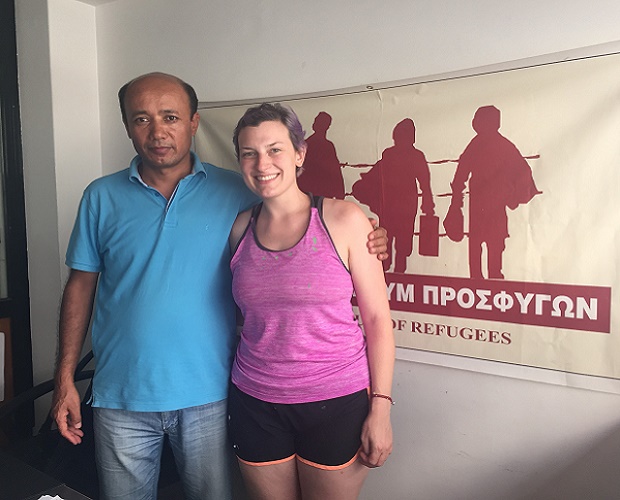
I’ve been home in the States for a couple of weeks now, and I’ve been super busy with a two-week course at Fletcher on Design and Monitoring for Peacebuilding and Development (I only kind of know what that means…). Travel and timing provided good excuses to put off my final podcast and blog, but something happened yesterday that jolted me out of my happy back-to-school transition and made it necessary to speak up.
The Greek Forum of Refugees moved to a new office last week. It is still in the Exarcheia neighborhood, just on a new street called Notara, and it is much bigger than the two rooms we had before, where people sometimes sat on stacks of paper instead of chairs and used hand-repaired computers that tech-savvy refugees found and fixed from the side of the road. The new space is more than an office—it will serve as a community center for the local refugee and migrant communities and organizations to meet and hold events. It has been an exciting and promising time to finally start the move into the new office.
But yesterday, I found out that on the very same street as our new office, just a few buildings down, there was a hate-fueled arson attack on a refugee squat. Notara 26 is an abandoned building that was occupied by the same solidarity movement/anarchist political group that organized the City Plaza squat that I have mentioned in previous blogs. Luckily no one was hurt, but the damage is significant. What’s more significant is what the attack symolizes. There haven’t been hate crimes in the Exarcheia neighborhood against refugees and migrants in some time. In fact, the reason that GFR moved to Exarcheia in the first place is because their previous office was vandalized, and Yonous and other members of GFR were physically attacked. He used to not talk about this incident—he kept it a secret for almost a year after it happened, at the same time fighting along with Human Rights Watch to get local legislation passed against hate crimes targeting migrants. But speaking out about his own experience helped garner support, and those efforts catalyzed a significant decrease in xenophobic attacks in Athens over the past 6 years.
And now it’s happening again. It is no wonder that refugees in Greece don’t feel safe. With reports of child sexual abuse in Greek refugee camps and the creeping influence of mafia gangs in a vulnerable and volatile situation, this new attack heightens the sense that the security situation resulting from the mishandling of the “refugee crisis” in Greece is a ticking time bomb.
In my last “Friday Feature Podcast” (note to self, never include a weekday in your podcast title unless you diligently post on that day), I talk to Yonous about why he doesn’t think Greece is facing a “refugee crisis.” It is a crisis of political will, solidarity, and responsibility sharing—but now it is beginning to feel like a crisis of security as well. Listen below to hear more.
Posted By Mattea Cumoletti
Posted Aug 25th, 2016

